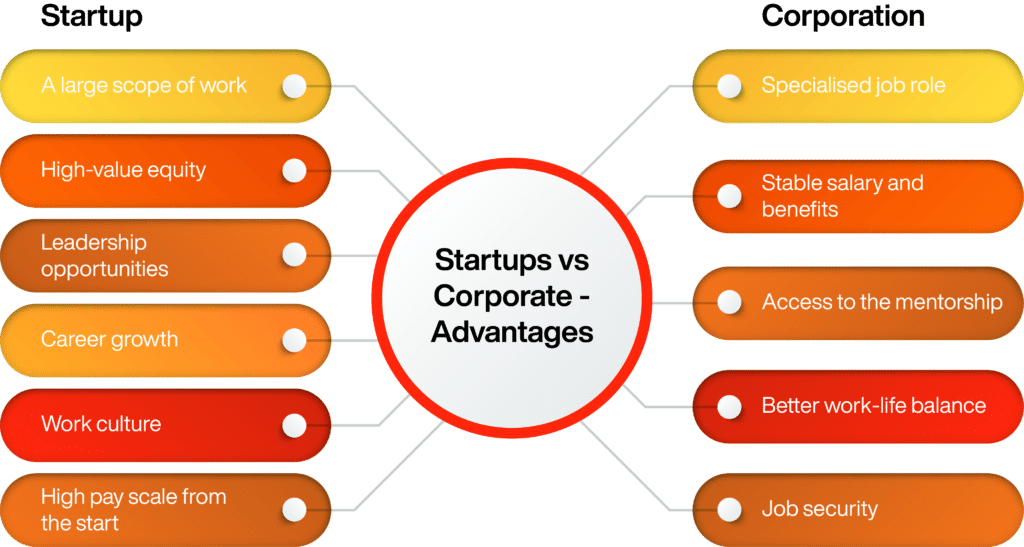The work environment you choose plays a crucial role in determining your career growth, satisfaction, and well-being. Knowing the dynamics of various workplaces can be advantageous when you’re fresh out of school or contemplating a career move.
Whether you’re eyeing the fast-paced energy of a startup or the structured environment of a corporate job, each option comes with its set of pros and cons.
In this blog, we will break down the key aspects of both work environments to help you decide upon the best path for your career.
Understanding the startup environment
The startup environment is competitive and can be described as fast-growing and full of energy. They are often newly established ventures that seek to provide innovative solutions.
The work culture in startups tends to be relaxed and employees are likely to work as a team more often motivated by their passion towards the company. Employees are expected to be flexible, come up with innovative ideas, and collaborate with founders or senior management of the company.
Flexibility is one of the most critical aspects of startups. It helps employees work on various assignments, learn more, and develop their careers.
Advantages of having a job in a startup

- Learning opportunities: Startups offer fresh graduates the best chance of gaining practical experience in multiple sectors. Individuals can be trained within a short period and can try out different positions to advance in their careers much faster than the conventional corporate world will allow.
- Direct impact: The opportunity to work in a startup is beneficial because one can observe the results of the work done. Individuals receive more attention and sometimes can directly contribute to decision-making.
- Innovation and creativity: Startups foster creativity. There is less rigidity in out-of-the-box approaches. There is potential to suggest solutions, implement changes, and be an active participant in the company’s development.
- Flat hierarchy and access to leadership: Due to their small size and low number of employees, startups tend to have less formal structures, especially in terms of organizational layers. Hence, you are likely to report to and even collaborate with founders and/or other members of top management. Such access offers useful information on the business, an aspect that is important in formulating a strategic plan.
Challenges of having a job in a startup
- Job security: There is usually a high risk associated with entering startups, as most fail to make it past their early years. Due to the possibility of employees being laid off, the business shifting its focus, or even closing down, job security may be considered a challenge.
- Work-life balance: It can be said that startup work is truly time-consuming and stressful as it typically requires employees to let their work-life permeate their daily lives.
- Limited resources and benefits: Companies in this stage may still be of small size and may not be able to offer good salaries, benefits, and other incentives as opposed to larger, more established companies.
- Ambiguity and uncertainty: The absence of set procedures can create a lot of confusion in the workplace. Hiring managers depend on the ability of their employees to perform well in uncertain environments.
- High expectations: Since all employees are valuable to startups, the performance standards are usually set high to achieve optimum organizational growth.
Understanding the corporate environment
The corporate world is a structured environment that is governed by guidelines and rules, which clear a path an employee will implement. Within a given department, different people take on different roles with responsibilities that are apparent. This evokes efficiency and frequency of operations.
Another characteristic feature of the corporate setting is stability. Corporations normally have long-established streams of revenues, standing clients, and even various forms of support structures to further ensure job security.
Health insurance, retirement plans, and paid leave are among the many fringe benefits that make employees feel that their jobs in a corporate establishment are truly stable.
Advantages of a corporate job
- Job stability and security: Corporations have a much more stable environment with predictable job security than compared to startups, a fixed salary and other benefits.
- Career development and training: Organizations invest in many forms, such as employee training and mentorship programs, and define a clear career path that an individual is likely to follow within the company.
- Work-life balance: Corporations’ employers provide set working schedules, paid vacations, and other measures that help employees balance their family and career responsibilities.
- Access to resources: Businesses are in a better position to fund their employees and provide state-of-the-art equipment and technological enhancements.
- Networking opportunities: Working for a corporate entity allows you to organize a large professional contact base with co-workers, clients, and members of the supply chain.
Challenges of having a corporate job

- Hierarchy and bureaucracy: Decision-making often takes a long time due to the hierarchy and numerous formalities involved. This can be cumbersome to those who expect to work independently and get quick results.
- Less direct impact: Those working within large corporations may not feel as much individual responsibility as there is always a larger chain of contributing factors in a large corporation.
- Risk of stagnation: Organizational careers may be unchallenging, monotonous or even lack the vitality of a startup in ways that can stifle creativity.
- Office politics: One of the primary concerns working for any company is usually office politics and internal rivalry that might interfere with an employee’s contentment or opportunity for advancement.
Startup vs corporate: Key factors to consider
When choosing between a startup and a corporate job, consider the following factors:
- Career goals: Startups are great for those who want to learn a lot in a very short time and are willing to be exposed to a lot of risks. However, corporates are great for those who seek job security and clear paths in the organization.
- Work culture: Next, startups are known to embrace a flat structure and a more friendly working environment compared to corporations, which are associated with bureaucracy.
- Risk tolerance: If you do not have problems with instability and volatility, you might consider a startup. If you are more comfortable with structure and routine, a corporate job is best.
- Growth opportunities: Startups represent faster yet higher levels of risk, while corporates present well-planned, professional growth with training and guidance.
- Work-life balance: Corporates usually have designated working hours, like 9 to 5, whereas startups may require more time and commitment.
Startup vs corporate: Which is best for the best career?
It is impossible to give one answer to this question, as it depends on personal preferences, what kind of job you would like to have in the future, and how much risk you are willing to take. Startups are suitable for people who excel in innovation and are ready to take risks, as it is adapted for those who work in startups.
On the other hand, if you believe in stability, quantified growth, and a clear career ladder, a corporate job is for you. Overall, the decision should be based on one’s career plan and current or future lifestyle preferences.
How do MAHE’s online programs help you have a bright career?
The Manipal Academy of Higher Education (MAHE) offers various online programs to aid your career progression, including:
- Postgraduate Certificate Program in Entrepreneurship & Innovation (PGCP-E&I)
To ensure that this program offers learners a tailored journey into entrepreneurship, the online Postgraduate Certificate Program in Entrepreneurship & Innovation (PGCP-E&I) is intended for individuals who are looking for a startup opportunity, young startup founders, existing business owners seeking growth, and heirs to family businesses. It comprises live, virtual and synchronized classes, business case studies, and practical consulting with experienced professionals.
- MBA
The MBA program offered online by Manipal Academy of Higher Education (MAHE) is designed to help you develop the skills to become a leader in the current fiercely competitive global business environment. Ten career-driven online MBA elective specializations are available to create successful learners’ careers in the domain and industry of their choice, including Human Resource Management (HRM), Finance, Marketing, Operations, Data Science, and Healthcare Management.
Conclusion
Choosing between a startup or corporate for career development is a decision that is dictated by the direction an individual wants to take. Thus, depending on the further career path, it is essential to choose the most suitable environment as each of them has its advantages and disadvantages.
Even if you choose the world of startups with their reckless rhythm or giant corporations with their strict order, the choice of the right education and skills may become a decisive factor. Online programs like the MBA and PGCP-E&I offered by MAHE give you the necessary skills for both careers, enabling informed career decisions and success.
Prepare for your next career milestone with us
















